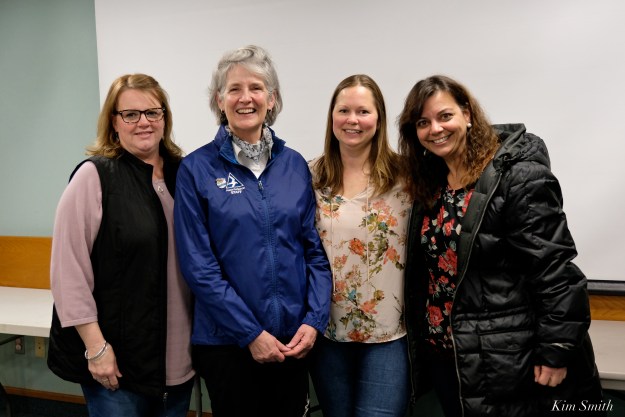The annual Northeast Coastal Waterbird Cooperators meeting was held live last week in Barnstable at Cape Cod Community College’s new science and engineering center. After several years of attending virtually, it was a joy to meet in person.
Conservation organization’s representatives from all eight Massachusetts coastal regions, along with representatives from New Jersey, New York, Connecticut, Rhode Island, New Hampshire, and Maine share numbers and anecdotes about breeding pairs of endangered and threatened shorebirds including Piping Plovers, Least Terns, American Oyster Catchers, Roseate Terns, and Black Skimmers. It’s fascinating to learn how we are largely all sharing similar experiences with predators and disturbances of all shapes and kinds. Carolyn Mostello, the Massachusetts Coastal Waterbird Biologist, directs the event and she does an extraordinary job of weaving all the information together.
Sharing numbers is followed by “Strange and Unusual,” a super fun section where field agents share funny/odd occurrences, photos, and videos for example, PiPl nests with five eggs, strangely colored and oddly shaped eggs, parking lot nesters, and more. Carolyn shared the trailer for my forthcoming film, The Piping Plovers of Moonlight Bay, and I am happy to share that it was very much enjoyed by the attendees!
The afternoon programs are especially fascinating with presenters sharing experiments and projects including two of special interest; one on using odors to deter mammalian predators and another with music and different sounds to deter Black-crowned Night Herons from eating shorebird eggs. All the programs are wonderfully educational.
Perhaps the most outstanding piece of information is that this year, Massachusetts was home to 1100 breeding pairs of Plovers. That may not sound like a whole heck of a lot considering our hundreds of miles of coastline, but 1,000 pairs has been a long held goal of shorebird recovery programs in Massachusetts. We should be super proud of our state. While many regions are seeing very little, none, or even worse, declining numbers, Massachusetts is leading the way in Piping Plover recovery!
















